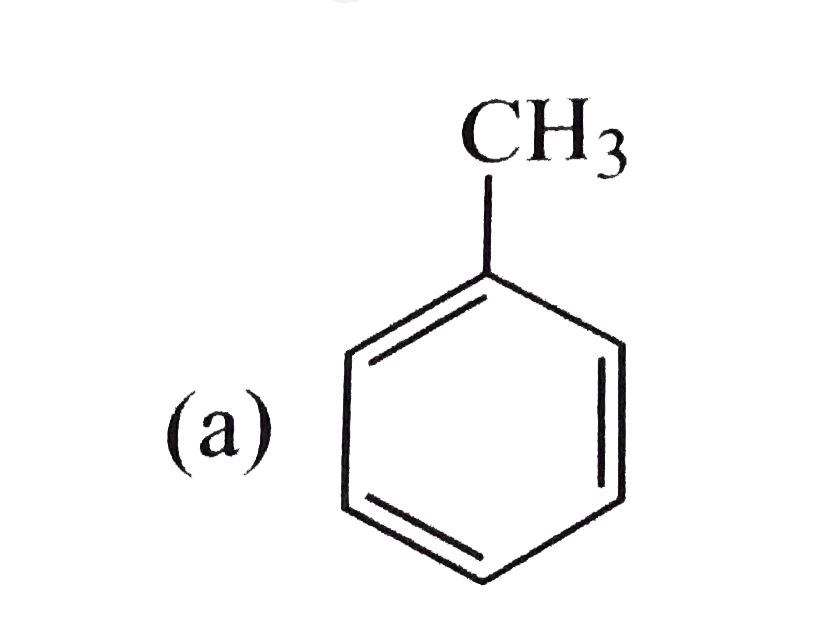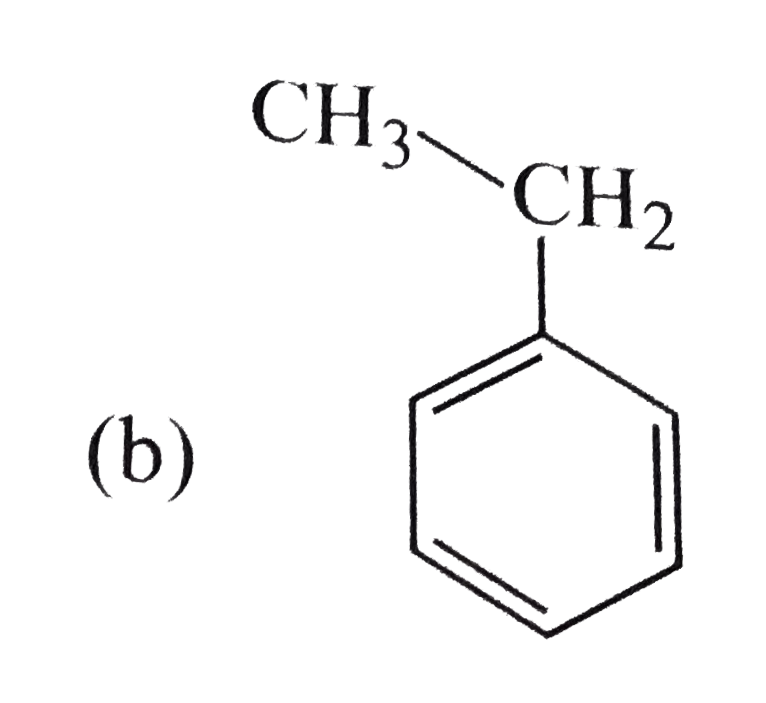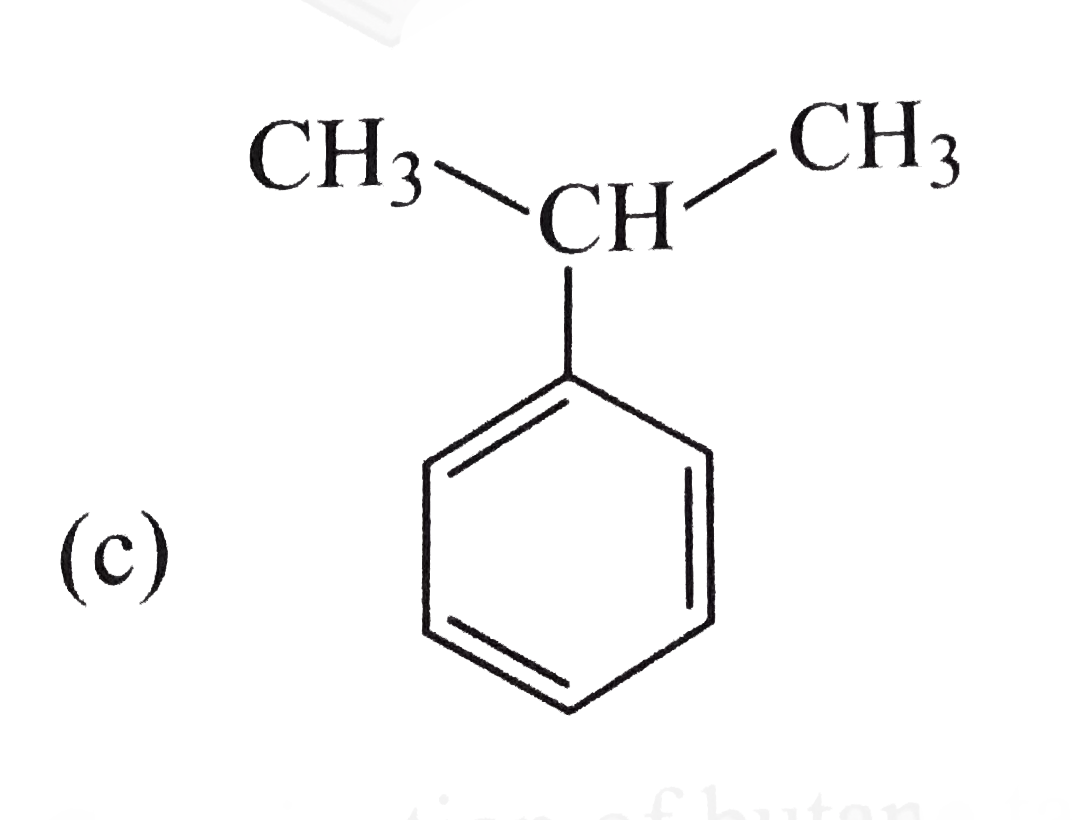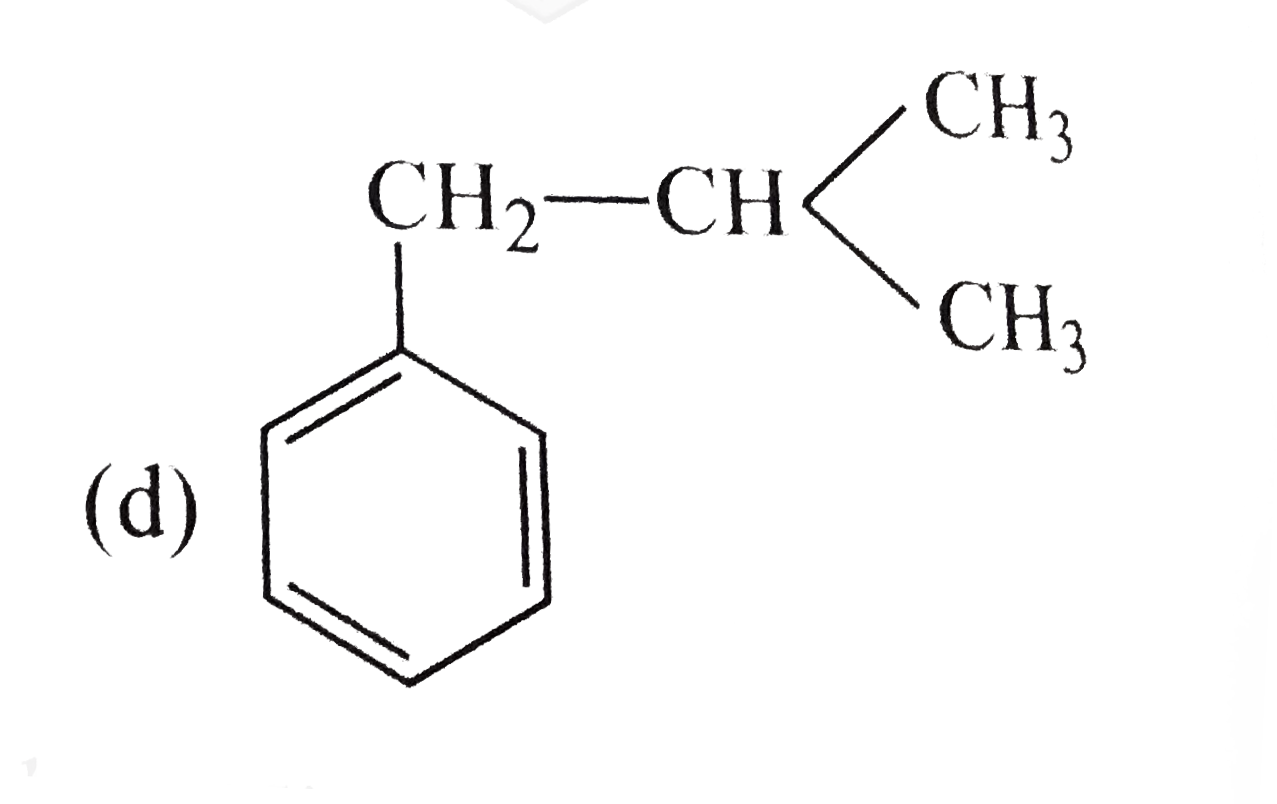Free radical halogenation takes place in the presence of light or at high temperature (abov 773K.) Formation of halogen free radical intermediate takes place in first step called chain initiation step.
CI2hv−−→2CI
This reaction is mainly given by those compound which have atleast one hydrogen atom present at sp3−hybrid carbon.
Reactivity of sp3−hybrid carbon depends on the reactivity of reaction intermediate.
The relative rate of formation of alkyl radicals by a chlorine radical is :
Tertiary(5)>Secondary(3.8)>Primary(1)
Percentage yield of the prodcut =Relative amount×100Sum of relative amounts
Relative amount = Number of hydrogen atoms on the respective carbon × relative reactivity.
NBS (N-bromo succinimide) is used for bromination at allylic and benzylic carbon, whereas Br2/hv gives bromination at benzylic allylic and alkyl carbon.
which one of the following compounds will react with NBS?
CH3−CH3∣C∣CH3−CH=CH2
C6H5−CH3∣C∣CH3−CH3−CH3
C6H5−CH2−CH=CH2
CH3−CH∣CH3−CH3
The correct Answer is:C
Step by step video, text & image solution for Free radical halogenation takes place in the presence of light or at high temperature (abov 773K.) Formation of halogen free radical intermediate takes place in first step called chain initiation step. CI_(2)overset(hv)(to)2CI This reaction is mainly given by those compound which have atleast one hydrogen atom present at sp^(3)-hybrid carbon. Reactivity of sp^(3)-hybrid carbon depends on the reactivity of reaction intermediate. The relative rate of formation of alkyl radicals by a chlorine radical is : underset((5))("Tertiary") gt underset((3.8))("Secondary") gt underset((1))("Primary") " Percentage yield of the prodcut "=("Relative amount"xx100)/("Sum of relative amounts") Relative amount = Number of hydrogen atoms on the respective carbon xx relative reactivity. NBS (N-bromo succinimide) is used for bromination at allylic and benzylic carbon, whereas Br_(2)//hv gives bromination at benzylic allylic and alkyl carbon. which one of the following compounds will react with NBS? by Chemistry experts to help you in doubts & scoring excellent marks in Class 12 exams.
Updated on:21/07/2023Topper's Solved these Questions
- HALOALKANES AND HALOARENES BOOK - OP TANDONCHAPTER - HALOALKANES AND HALOARENES EXERCISE - Single Interger answer type questions
14 Videos
- HALOALKANES AND HALOARENES BOOK - OP TANDONCHAPTER - HALOALKANES AND HALOARENES EXERCISE - Matrix -Match Type Questions
8 Videos
- ELECTROCHEMISTRYBOOK - OP TANDONCHAPTER - ELECTROCHEMISTRYEXERCISE - Matrix-Matching Type Question
3 Videos
- ISOMERISM (STRUCTURAL AND STEROISOMERISM)BOOK - OP TANDONCHAPTER - ISOMERISM (STRUCTURAL AND STEROISOMERISM)EXERCISE - INTEGER
7 Videos
Similar Questions
Free redical halogenation takes place in presence of light or at high temperature (above 500∘C). Formation of halogen free radical intermediate takes place in first step called chain initiation step.
Cl2hv−−→2Cl∗
This reaction is mainly given by those compounds which have at least one hydrogen atom present at sp3 -hybrid carbon. Reactivity of sp3-hybrid carbon depends on the reactivity of reaction intermediate.
The relative rate of formation of alkyl radicals by a chlorine radical is:
Tertiary(5)>Secondary(3.8)>Primary(1)
Percentage yield of the product=Relative amount×100Sum of relative amounts
Relative amount=Number of hydrogen atoms on the respective carbon×relative reactivity.
NBS(N-bromosuccinimide) is used for bromination at allylic and benzylic carbon, whereas Br2/hv gives bromination at benzylic, allylic and allyl carbons.
Which one of the following compounds will react with NBS?
View SolutionFree redical halogenation takes place in presence of light or at high temperature (above 500∘C). Formation of halogen free radical intermediate takes place in first step called chain initiation step.
Cl2hv−−→2Cl∗
This reaction is mainly given by those compounds which have at least one hydrogen atom present at sp3 -hybrid carbon. Reactivity of sp3-hybrid carbon depends on the reactivity of reaction intermediate.
The relative rate of formation of alkyl radicals by a chlorine radical is:
Tertiary(5)>Secondary(3.8)>Primary(1)
Percentage yield of the product=Relative amount×100Sum of relative amounts
Relative amount=Number of hydrogen atoms on the respective carbon×relative reactivity.
NBS(N-bromosuccinimide) is used for bromination at allylic and benzylic carbon, whereas Br2/hv gives bromination at benzylic, allylic and allyl carbons.
Arrange decreasisng order of reactivity of given compounds with NBS (N-bromosuccinimide).
I. C6H5−CH3
II. C6H5−CH2−CH2−CH3
III. C6H5−CH2−CH=CH2
IV. C6H5−CH| CH3−CH=CH2
Select the correct answer from the codes given below:
View Solution
Knowledge Check
Free radical halogenation takes place in the presence of light or at high temperature (abov 773K.) Formation of halogen free radical intermediate takes place in first step called chain initiation step.
CI2hv−−→2CI
This reaction is mainly given by those compound which have atleast one hydrogen atom present at sp3−hybrid carbon.
Reactivity of sp3−hybrid carbon depends on the reactivity of reaction intermediate.
The relative rate of formation of alkyl radicals by a chlorine radical is :
Tertiary(5)>Secondary(3.8)>Primary(1)
Percentage yield of the prodcut =Relative amount×100Sum of relative amounts
Relative amount = Number of hydrogen atoms on the respective carbon × relative reactivity.
NBS (N-bromo succinimide) is used for bromination at allylic and benzylic carbon, whereas Br2/hv gives bromination at benzylic allylic and alkyl carbon.
Select most reactive compound for chlorination in presence of light :A B
B C
C D
D
Free radical halogenation takes place in the presence of light or at high temperature (abov 773K.) Formation of halogen free radical intermediate takes place in first step called chain initiation step.
CI2hv−−→2CI
This reaction is mainly given by those compound which have atleast one hydrogen atom present at sp3−hybrid carbon.
Reactivity of sp3−hybrid carbon depends on the reactivity of reaction intermediate.
The relative rate of formation of alkyl radicals by a chlorine radical is :
Tertiary(5)>Secondary(3.8)>Primary(1)
Percentage yield of the prodcut =Relative amount×100Sum of relative amounts
Relative amount = Number of hydrogen atoms on the respective carbon × relative reactivity.
NBS (N-bromo succinimide) is used for bromination at allylic and benzylic carbon, whereas Br2/hv gives bromination at benzylic allylic and alkyl carbon.
Chlorinating agent for free radical chlorination may be taken as :ACl2BSO2Cl2C(CH3)3C−O−ClDPCl5Free radical halogenation takes place in the presence of light or at high temperature (abov 773K.) Formation of halogen free radical intermediate takes place in first step called chain initiation step.
CI2hv−−→2CI
This reaction is mainly given by those compound which have atleast one hydrogen atom present at sp3−hybrid carbon.
Reactivity of sp3−hybrid carbon depends on the reactivity of reaction intermediate.
The relative rate of formation of alkyl radicals by a chlorine radical is :
Tertiary(5)>Secondary(3.8)>Primary(1)
Percentage yield of the prodcut =Relative amount×100Sum of relative amounts
Relative amount = Number of hydrogen atoms on the respective carbon × relative reactivity.
NBS (N-bromo succinimide) is used for bromination at allylic and benzylic carbon, whereas Br2/hv gives bromination at benzylic allylic and alkyl carbon.
Arrange decreasing order of reactivity of given compounds with NBS :(N-bromo succinimide)
I.C6H5−CH3
II.C6H5−CH2−CH2CH3
III.C6H5−CH2−CH=CH2
IV.C6H5−CH∣CH3−CH=CH2
Select the correct answer from the codes given below
Codes:AIV,III,I,IIBIV,III,II,ICI,II,III,IVDI,III,II,IV
Free redical halogenation takes place in presence of light or at high temperature (above 500∘C). Formation of halogen free radical intermediate takes place in first step called chain initiation step.
Cl2hv−−→2Cl∗
This reaction is mainly given by those compounds which have at least one hydrogen atom present at sp3 -hybrid carbon. Reactivity of sp3-hybrid carbon depends on the reactivity of reaction intermediate.
The relative rate of formation of alkyl radicals by a chlorine radical is:
Tertiary(5)>Secondary(3.8)>Primary(1)
Percentage yield of the product=Relative amount×100Sum of relative amounts
Relative amount=Number of hydrogen atoms on the respective carbon×relative reactivity.
NBS(N-bromosuccinimide) is used for bromination at allylic and benzylic carbon, whereas Br2/hv gives bromination at benzylic, allylic and allyl carbons.
Select most reactive compound for chlorination in presence of light:
View SolutionHunsdiecker reaction involve free radical in intermediate steps.
View SolutionFree radical halogenation takes place in the presence of light or at high temperature (abov 773K.) Formation of halogen free radical intermediate takes place in first step called chain initiation step.
CI2hv−−→2CI
This reaction is mainly given by those compound which have atleast one hydrogen atom present at sp3−hybrid carbon.
Reactivity of sp3−hybrid carbon depends on the reactivity of reaction intermediate.
The relative rate of formation of alkyl radicals by a chlorine radical is :
Tertiary(5)>Secondary(3.8)>Primary(1)
Percentage yield of the prodcut =Relative amount×100Sum of relative amounts
Relative amount = Number of hydrogen atoms on the respective carbon × relative reactivity.
NBS (N-bromo succinimide) is used for bromination at allylic and benzylic carbon, whereas Br2/hv gives bromination at benzylic allylic and alkyl carbon.
CH3CH2CH2CH3+CI2hv−−−−−→Light
CH3O∣CHCH2CH32-Chlorobutane+CH3CH2CH2CI1-Chlorobutane
Percentage yield of 2-chlorobutane will be:
View SolutionIn an sp-hybridized carbon atom,
View SolutionThe compound in which all carbon atoms use only sp3-hybrid orbitals for bond formation is:
View Solution
